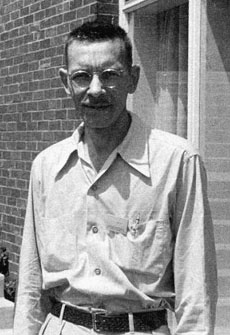Alfred Hershey
Alfred Day Hershey (December 4, 1908 – May 22, 1997) was an American bacteriologist and geneticist. He was awarded the Nobel Prize in Physiology or Medicine in 1969, alongside Max Delbrück and Salvador Luria, for their discoveries concerning the genetic structure of viruses. Hershey's most famous experiment, the Hershey-Chase experiment, conducted in 1952 with Martha Chase, provided key evidence that DNA (deoxyribonucleic acid) is the material responsible for genetic inheritance.
Early Life and Education[edit | edit source]
Alfred Hershey was born in Owosso, Michigan. He developed an interest in chemistry during his high school years. Hershey pursued his undergraduate studies at Michigan State College (now Michigan State University), where he received a B.S. in chemistry in 1930. He went on to earn a Ph.D. in bacteriology from the University of Chicago in 1934, focusing his research on the bacteriophage, a type of virus that infects bacteria.
Career and Research[edit | edit source]
After completing his doctorate, Hershey joined the faculty at the Washington University School of Medicine in St. Louis. In 1950, he moved to the Carnegie Institution for Science in Cold Spring Harbor, New York, where he spent the majority of his career. Hershey's research at Carnegie was primarily focused on the genetics of bacteriophages.
The Hershey-Chase experiment, which he conducted with Martha Chase, was a landmark study in molecular biology. By using radioactive isotopes to label the DNA and proteins of the T2 bacteriophage, Hershey and Chase were able to demonstrate that only the DNA of the virus entered the bacterial cells and directed the synthesis of new viruses. This experiment was crucial in establishing DNA as the hereditary material in organisms, a fundamental concept in genetics and molecular biology.
Nobel Prize[edit | edit source]
In 1969, Alfred Hershey was awarded the Nobel Prize in Physiology or Medicine along with Max Delbrück and Salvador Luria for their work on the replication mechanism and genetic structure of viruses. Their collective research laid the groundwork for the field of molecular genetics.
Legacy[edit | edit source]
Alfred Hershey's contributions to the field of genetics and virology have had a lasting impact on the scientific community. The Hershey-Chase experiment is considered one of the most important experiments in the history of biology, as it helped to clarify the role of DNA in heredity. Hershey's work has influenced countless researchers and has been fundamental in the development of modern genetic engineering and biotechnology.
Hershey was also known for his humility and for being somewhat reclusive, preferring to focus on his research rather than on personal accolades. Despite his significant achievements, he remained dedicated to his work until his retirement in 1974.
Death[edit | edit source]
Alfred Hershey passed away on May 22, 1997, in Syosset, New York. His legacy continues through the Alfred D. Hershey Collection at the Cold Spring Harbor Laboratory Library, which houses his scientific papers and memorabilia, preserving the history of his groundbreaking work.
Search WikiMD
Ad.Tired of being Overweight? Try W8MD's physician weight loss program.
Semaglutide (Ozempic / Wegovy and Tirzepatide (Mounjaro / Zepbound) available.
Advertise on WikiMD
|
WikiMD's Wellness Encyclopedia |
| Let Food Be Thy Medicine Medicine Thy Food - Hippocrates |
Translate this page: - East Asian
中文,
日本,
한국어,
South Asian
हिन्दी,
தமிழ்,
తెలుగు,
Urdu,
ಕನ್ನಡ,
Southeast Asian
Indonesian,
Vietnamese,
Thai,
မြန်မာဘာသာ,
বাংলা
European
español,
Deutsch,
français,
Greek,
português do Brasil,
polski,
română,
русский,
Nederlands,
norsk,
svenska,
suomi,
Italian
Middle Eastern & African
عربى,
Turkish,
Persian,
Hebrew,
Afrikaans,
isiZulu,
Kiswahili,
Other
Bulgarian,
Hungarian,
Czech,
Swedish,
മലയാളം,
मराठी,
ਪੰਜਾਬੀ,
ગુજરાતી,
Portuguese,
Ukrainian
Medical Disclaimer: WikiMD is not a substitute for professional medical advice. The information on WikiMD is provided as an information resource only, may be incorrect, outdated or misleading, and is not to be used or relied on for any diagnostic or treatment purposes. Please consult your health care provider before making any healthcare decisions or for guidance about a specific medical condition. WikiMD expressly disclaims responsibility, and shall have no liability, for any damages, loss, injury, or liability whatsoever suffered as a result of your reliance on the information contained in this site. By visiting this site you agree to the foregoing terms and conditions, which may from time to time be changed or supplemented by WikiMD. If you do not agree to the foregoing terms and conditions, you should not enter or use this site. See full disclaimer.
Credits:Most images are courtesy of Wikimedia commons, and templates, categories Wikipedia, licensed under CC BY SA or similar.
Contributors: Prab R. Tumpati, MD

